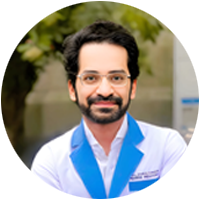Bivek Singh, MD | Foundations of Clinical Research

In the early stages of his neurology residency, amid the COVID-19 pandemic, Bivek Singh, MD, made the decision to apply for the Foundations of Clinical Research program at Harvard Medical School. Little did he know that this choice would coincide with a challenging period in his life. On the day his acceptance letter arrived, his father, a beloved health assistant in Nepal, was diagnosed with pancreatic cancer. As Singh began orientation in Dubai, his father started chemotherapy; by the end of the program, he received disheartening news about the prognosis.
“Despite these personal challenges, the program holds a special place in my heart. Stepping into the orientation hall, I felt the power of a global community, rich in diverse backgrounds and languages,” he recalls. “The faculty’s humility, paired with their impressive qualifications, created an environment that encouraged openness and collaboration.”
Over six intensive months, these connections broadened and deepened. Singh and his peers created a social media WhatsApp group, which evolved into a platform for expressing gratitude to their mentors through a heartfelt video. Today, they continue to provide unwavering support to one another. “This newfound strength propelled me into a journey of collaboration and networking,” he says, “significantly fortifying my foundation and bolstering my confidence.”
After completing the program, Singh quickly put his newfound skills to work in Nepal as the founder of NEDOL, whose initial mission was to support medical professionals during the COVID-19 pandemic. Since then, the nonprofit organization has evolved into the largest academic virtual forum for Nepalese doctors, with more than 11,200 members to date. The platform facilitates discussions on academics, collaborates with the medical association and the medical council, and officially partners with the Nepal Health Research Council for research training.
A prolific contributor to prestigious journals, his article, “Nepal’s woeful health care system: Unheard stories of Nepali doctors,” was featured in The Himalayan Times. But most important to Singh was the publication of an article in Nepali, which recounted the remarkable 50-year health care journey of his father and the driving force behind his pursuit of a career in medical science. “Concurrently, my book bearing the title People’s Doctor was published in honor of my father, further encapsulating his enduring legacy,” he adds.
Singh is a journal reviewer for Neuroprotection, the Journal of Medicine, Surgery, and Public Health, and Heliyon. In 2023, six of his research papers appeared in journals affiliated with Oxford University Press, Springer Nature, PLOS One, and Medknow/Wolters Kluwer. Additionally, he serves as a youth editor for Gene and Protein in Diseases, an international publication focusing on molecular and translational medicine.
But Singh’s amazing story doesn’t end here. “I am currently collaborating with colleagues from the program on a couple of new research projects,” he says. “Foundations of Clinical Research acted as a catalyst, helping me to reach a broader audience, connect with colleagues globally, and acquire essential life skills. It’s a testament to the transformative power of the program.”
In recognition of his impactful work in the field of education across Asia, Singh was selected as the Outstanding Young Educator of the Year for 2024 in Manila, Philippines, and was honored with the Outstanding Contribution in Education award at the Asian Education Awards in Bangkok, Thailand.